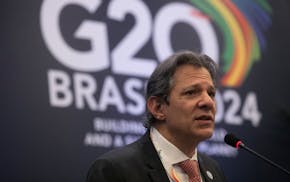While preparing for a review meeting with a client earlier this month, we waited for President Donald Trump to address the nation. It was the morning after Iran had fired missiles at U.S. military bases in Iraq. Although tensions in the Middle East have simmered down (relatively speaking) since the first week of January, it seemed Trump's first official public comments were worthy of our attention.
A few minutes into his speech, we had to abandon the news conference to commence a regularly scheduled client meeting. "Are you watching the president?" we asked the client after greetings were exchanged. "Why would I?" was his response. "You guys told me none of that stuff matters to my portfolio."
Countless times to countless clients, we have communicated the facts that presidential elections and geopolitical events might move markets in the short term, but rarely have meaningful long-term effect.
On the day a U.S. drone targeted and killed Iran Maj. Gen. Qassem Soleimani, the S&P 500 fell 0.71%. The Dow Jones industrial average lost 234 points. After four days — a period that included Iran's retaliation and missile firings — the major equity indexes were back at all-time highs. If the stock market had a Richter scale, the entire episode would hardly have registered a tremor.
Fleeting impact of big news
In an age where most of us carry internet access in our pockets, it's more difficult than ever to ignore the troubles of the world. Political dysfunction and military conflict may not be any more prevalent in 2020, but they sure feel more saturating. It's important to acknowledge these events and consider their real world consequences. Just don't allow them to influence major investment decisions.
Before the pop-up conflict with Iran, our country's trade war with China was the international battle most difficult for investors to ignore. Earlier this week, American and Chinese representatives signed "Phase One" of a formal agreement, marking the unofficial end to a chapter in this ongoing saga.
It has been 18 months since the first U.S. tariffs were imposed on Chinese goods by the Trump administration. In that time, the S&P and Dow have risen 15% to 20%. That's better annualized performance than historical averages and nothing remotely close to the economic banana peel some predicted.
That brings us to the pending impeachment trial of our president, the latest act in a political theater devoid of bipartisan actors. Make no mistake, it's a sad state of affairs no matter which side of the aisle you sit on, but impeachment is not (and will not be) a legitimate driver of stock prices. The market has already suggested as much. Since Trump was impeached by the House of Representatives on Dec. 18, the S&P has climbed 3%.
A Republican-controlled Senate, of course, is seen as unlikely to convict the president. But even in the most extreme scenario — Trump being evicted from office — his successor would step into a divisive environment during an election year with no realistic shot at effecting meaningful change.
In the weeks to come, impeachment will fill the calendars of U.S. senators and further worsen the brutal inefficiencies of government. As it turns out, however, political gridlock is not a bad thing for the stock market. The S&P 500 is coming off calendar-year gains close to 30% and corporate earnings will once again post year-over-year growth in 2020 now that 2018 earnings juiced by corporate tax cuts are no longer the measuring stick.
Watch the smaller stuff
Gridlock means more of the same, and in this economic climate, that's something stocks have celebrated.
To be clear, political dysfunction and global conflicts are not justifiably enough to drag markets significantly lower on their own. But they can certainly contribute to a growing sentiment of negativity.
Many people are under the impression that a single major event will be the cause of the market's next big correction. More likely, however, it will be a convergence of several smaller factors that become too heavy to bear.
With a forward price-to-earnings ratio approaching 19, valuations for the S&P 500 are considerably higher than they were a year ago and nearing the most expensive point in the last decade. According to Goldman Sachs, 92% of market appreciation last year is attributable to higher valuations (as opposed to higher earnings).
Many stocks, in other words, bounced in 2019 due to the anticipation of better results to come in 2020. Companies have yet to deliver on those expectations.
Those are genuine reasons to express concern about equities in the year ahead. As for the other stuff, the market knows better.
Ben Marks is chief investment officer at Marks Group Wealth Management in Minnetonka. He can be reached at ben.marks@marksgroup.com. Brett Angel is a senior wealth adviser at the firm.
New York City turns to AI-powered scanners in push to keep guns out of the subway system
North Carolina regulators says nonprofit run by lieutenant governor's wife owes the state $132K


